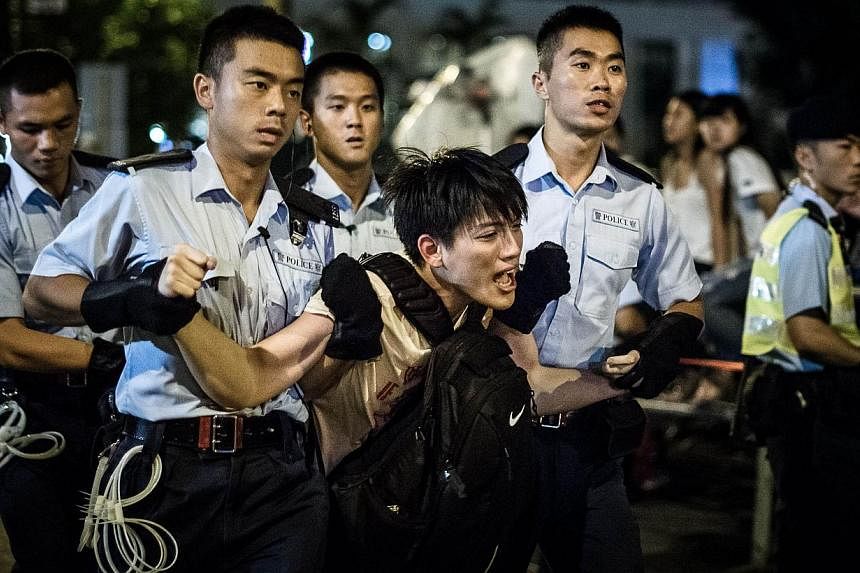|
HONG KONG (AFP) - Scores of protesters at a Hong Kong sit-in were forcibly removed by police in the early hours of Wednesday following a massive pro-democracy rally which organisers said saw a turnout of over half a million.
Hundreds of protesters had staged a sit-in on a street in the city's Central district and vowed to stay until 8.00am (0000 GMT). But just after 3.00am, police began to move in and load them onto coaches.
Some went willingly but those that remained linked arms and refused to leave, many of them lying down, as police announced they would use "necessary force" unless they boarded "designated vehicles".
Groups of officers then began to cordon off and physically remove protesters, carrying them from the site.
A police tannoy said that all those remaining were under arrest for causing "obstruction and danger to road users" and for unauthorised assembly.
As of 6.00am, two groups of defiant protesters singing songs remained in a stand-off with police.
Those who were removed were taken to a police college in the south of Hong Kong, according to the South China Morning Post.
Police were not immediately able to confirm how many people had been arrested.
'Record' rally
The confrontation followed a largely peaceful rally on Tuesday, which organisers said was a record turnout and the largest since the city was handed back to China in 1997.
Waving colonial-era flags and chanting anti-Beijing slogans, protesters demanded democratic reforms, reflecting surging discontent over Beijing's insistence that it vet candidates before a vote in 2017 for the semi-autonomous city's next leader.
The rally came after nearly 800,000 people took part in an informal referendum calling for voters to be allowed a say in the nomination of candidates.
Beijing branded the vote "illegal and invalid".
Despite soaring humidity and rainstorms, swarms of protesters poured onto clogged streets through the afternoon and evening, marching from Victoria Park to the Central business district.
They carried banners emblazoned with slogans, including "We want real democracy" and "We stand united against China".
Johnson Yeung, a rally organiser, said at least 510,000 protesters had attended - believed to be a record for July 1 protests, an annual outpouring of discontent directed at both China's communist government and the local leadership.
"This year people came out braving the rain and wind and many citizens joined along the way," Yeung told a cheering crowd in the city's Central business district late Tuesday.
Yeung told AFP that the turnout marked a "record" since the 1997 handover from former colonial power Britain to China.
Official estimates of the turnout were more conservative, with police saying 98,600 people took part during the "peak" of the rally, without elaborating.
Desire for democracy
"There is a strong desire for genuine democracy that offers choice and competition without (political) vetting," Anson Chan, a former number two official in Hong Kong who is now a pro-democracy activist, told reporters on Tuesday.
The chairman of the Hong Kong post office union, marching in the muggy heat, said the city's government was kowtowing to Beijing.
"This march is not for us, it's for our children. Without universal suffrage there's no way to monitor the government," said Ip Kam-fu.
The city's Chief Executive Leung Chun-ying sought to strike a conciliatory note, saying his government would do its utmost to forge an agreement on implementing universal suffrage.
He offered no details on the 2017 election when he spoke at a ceremony earlier on Tuesday marking the 17th anniversary of the city's handover.
"Hong Kong is turning into a place with less and less freedom," Eric Wong, a 24-year-old photographer who took part in the rally, told AFP. "It is transforming into the mainland." Under the "one country, two systems" agreement reached at the time of the handover, Hong Kong enjoys liberties not seen on the mainland, including free speech and the right to protest.
But there are heightened fears that those freedoms are being eroded.
Concerns increased in June when Beijing published a controversial "white paper" on Hong Kong's future, widely seen as a warning to the city not to overstep the bounds.
Pro-democracy group Occupy Central, which organised the unofficial referendum, has said that it will stage a mass sit-in in the city's business district later this year unless authorities come up with acceptable electoral reforms.
The poll, which ended on Sunday, gave three options for the election of the city's next leader - all of which included the public having some influence on the selection of candidates.
China has promised to let all Hong Kong residents vote for their next leader in 2017 - currently a 1,200-strong pro-Beijing committee chooses the city's chief executive.
But it says candidates must be approved by a nomination committee, which democracy advocates fear will mean only pro-Beijing figures are allowed to stand.
|

